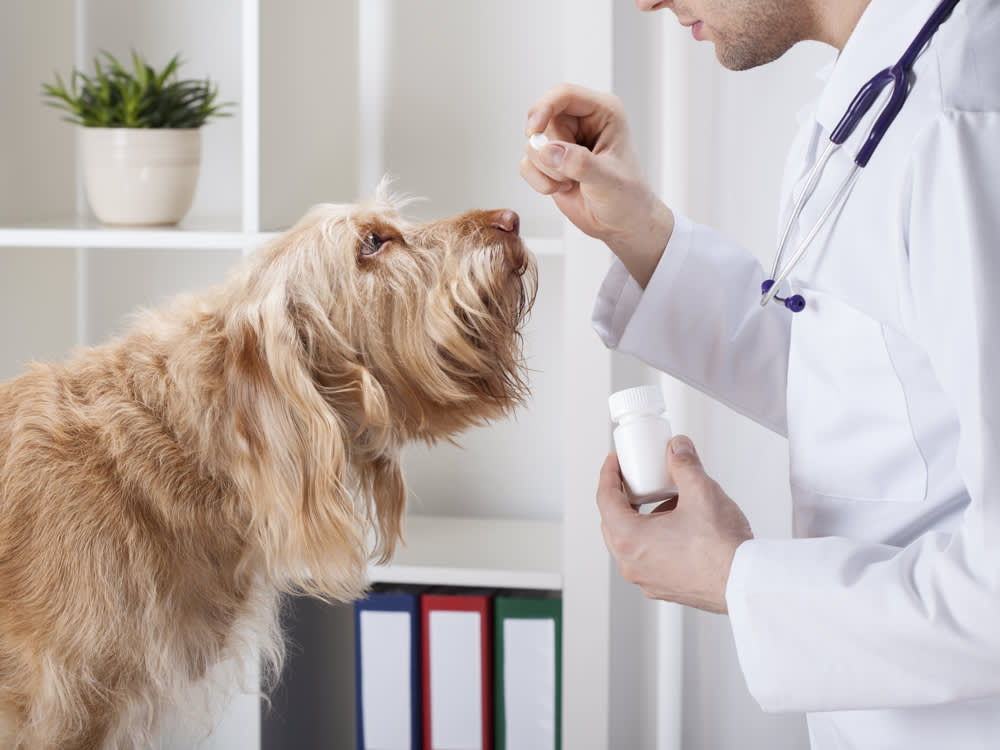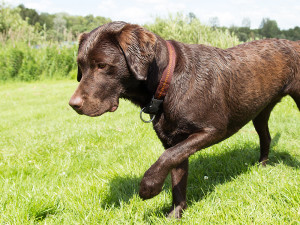How to Find a Veterinary Specialist
Just like your doctor would refer to you a specialist for expert care for a complicated issue, your vet may do the same for your dog.
Finding an appropriate veterinary specialist ensures your pet receives expert care for complex conditions. Choosing wisely leads to optimal treatment, giving you and your pet the support you need through challenging diagnoses.
What is a Veterinary Specialist?
Veterinary specialists have specific education and hands-on experience that general practice vets don‘t have, says Dr. Nancy Kay, a board-certified specialist in small animal internal medicine in Rohnert Park, CA, and author of Speaking for Spot: Be the Advocate Your Dog Needs to Live a Happy, Healthy, Longer Life. “Veterinary specialists have two or more years of in-depth residency training, often receiving one-on-one guidance from clinicians who are experts in their fields,” she says.
Snap a pic of your pup’s teeth, and GREENIES™ will help you spot potential signs of oral health issues.
Veterinary specialists — experts in everything from anesthesia to cancer — have been around since the 1950s, when the American Veterinary Medical Association (AVMA) established the American Board of Veterinary Specialties (ABVS) to serve as an umbrella organization for all AVMA-recognized specialty groups.
Today, the ABVS represents 39 distinct specialties, which are practiced by members of 20 specialty organizations, some of which encompass several disciplines (for example, the American College of Veterinary Internal Medicine, or ACVIM, covers large and small animal internal medicine, plus oncology, cardiology, and neurology). More than 9,000 U.S. veterinarians — roughly nine percent of all vets in the country — are members, or board-certified diplomates, of these organizations. To become a diplomate, a vet must complete postgraduate coursework and residency and pass a certification exam. Sometimes, that means several years of additional training after vet school.
How much do you spend on your pet per year?
In addition to the AVMA-recognized specialty groups, a few organizations offer specialized training and certification to vets who have added physical rehabilitation and various types of alternative medicine like acupuncture to their practices (more on that below).
What‘s the Difference Between a Vet and Veterinary Specialist?
Veterinary specialists must take additional coursework and complete an internship (or its equivalent) at an active veterinary practice. The expertise demanded of specialty veterinarians is especially important in veterinary medicine, because vets — unlike human doctors — can legally perform any accepted procedure on your dog, says Dr. Mitch Robbins, a diplomate of the American College of Veterinary Surgeons (ACVS) who practices at the Veterinary Specialty Center in Buffalo Grove, IL. “If you needed surgery, your doctor is required to refer you to a surgeon,” he says. “They can’t just operate on you themself. But if your dog needs surgery, your regular vet can do it. The question isn’t whether they can perform the procedure — it’s whether they are the best person to do it.”
Another difference is equipment — specialists have high-tech radiology, neurosurgery, and diagnostic machines that regular vets almost never have. Specialists have received training on this equipment and are well versed in the latest therapies and technologies, says Patty Khuly, a general-practice veterinarian in Miami, FL. “They’ve invested in the kinds of equipment that I wouldn‘t buy for my practice,” she says. “Generally speaking, specialists are at least four years ahead of everybody else, which is a lot in veterinary medicine.”
How Do I Know If My Dog Needs to See a Specialist?
Usually, your primary vet will refer you to a veterinary specialist, although you might end up meeting one on your own if you bring your dog in to a specialty hospital for emergency care. Most general practice veterinarians will readily suggest a specialist in cases that are beyond their area of expertise, says Dr. Khuly. “A few vets might want to do everything in-house, or they might feel that the client wouldn’t want to see a specialist for financial or other reasons, but most routinely make referrals,” she says. The protocol is much like the one in human medicine, she says. “The general practitioner is your go-to person for everyday issues, but the specialist is who you see for more complicated problems.”
For example, your family vet might suggest you see a specialist for treatment of a known disease or condition (such as heart rhythm abnormalities or diabetes), says Dr. Kay. You also might be sent to a specialist if your dog isn’t getting better — or is getting worse — despite the treatment they’re currently receiving. Dr. Kay also recommends seeking a specialist for a second opinion, or if you just want assurance about your dog’s care or have a “gut feeling” that they might need more than your family vet can provide.
You may also want to seek out a specialist if your dog needs diagnostic procedures beyond the scope of what your regular vet provides. For example, endoscopy — a nonsurgical way to evaluate a dog’s respiratory, gastrointestinal, or urinary tract or remove growths or tissue for biopsy — is generally left to the specialists, says Dr. Kay. “Some general practitioners perform endoscopy procedures, but unless they’ve received extensive training, they won’t have nearly the experience that a specialist in internal medicine does,” she notes.
What If My Dog Needs a Veterinary Surgeon?
One of the most common reasons pet parents seek veterinary specialists (and the most common reason general practice vets make referrals) is for surgery. “Most family veterinarians know that they can’t perform a total hip replacement, and they’re not about to take out a big scary cancer mass,” says Dr. Khuly. “They know that they have limits, and so they’ll refer those cases to a surgeon.”
If your veterinarian recommends taking your dog to a veterinary surgeon (or if you think you should see one for a second opinion), do your homework — on both the surgeon and the surgery that your vet has recommended — before the consultation, says Dr. Kay. Find out if the surgeon is board certified, and ask about their experience in cases like your dog’s. Be sure to bring your dog’s medical records, including the latest x-rays, lab results, and prescriptions, to the appointment.
When you meet with a surgeon, Dr. Robbins recommends asking the following questions:
What’s the advantage of surgery over nonsurgical options? Are there any alternatives that we could consider?
Why do you think my dog is a good candidate for this procedure? Are there additional tests that should be performed (such as “staging” of cancer)?
What are the risks and possible complications of this surgery? What is the prognosis for my dog, given their health background and age?
Will my dog need to remain in the hospital immediately after the surgery? Does your hospital provide 24/7 care?
How much post-operative rehabilitation will my dog need, and what will it entail? Do I need to buy special equipment, like an orthopedic bed or baby gates for the stairs?
“Any time you’re talking about a surgical procedure that has some complexity to it, the least you should do is talk to a surgeon,” says Dr. Robbins. “The ‘second opinion’ is the basis of specialized medicine in humans, and it’s the best way for you to be an advocate for your dog. You always want to know if there’s something new or better that could be done to manage your dog’s condition and give them a better quality of life.”
How to Find a Veterinary Specialist Near You
These organizations can help you search for the veterinary specialist your dog needs:
Acupuncture
Vets are certified by the International Veterinary Acupuncture Societyopens in new tab (IVAS) and can treat issues arthritis, skin, respiratory, gastrointestinal problems, and more.
Behavior
Specialists are certified by the American College of Veterinary Behavioristsopens in new tab (ACVB) and treat behavioral issues, such as aggression and anxiety.
General Canine and Feline Medicine
These specialists are certified by the American Board of Veterinary Practitionersopens in new tab (ABVP), which offers certification for general practitioners who focus on dogs and cats.
Chiropractic
Vets are certified by Animal Chiropractic Certification Commissionopens in new tab (ACCC) and treat various types of muscle, nerve, and joint pain.
Nutrition
Vets are certified by the American College of Veterinary Nutritionistsopens in new tab (ACVN) and treat gastrointestinal issues.
Dentistry
Certified by the American Veterinary Dental Collegeopens in new tab (AVDC), these vets treat dental issues in dogs and cats.
Internal Medicine
Diplomates are certified by the American College of Veterinary Internal Medicineopens in new tab (ACVIM) in small or large animal internal medicine, cardiology, oncology or neurology; they treat conditions like diabetes, heart disease, and cancer.
Ophthalmology
Certified by the American College of Veterinary Ophthalmologists opens in new tab(ACVO), these specialists treat eye diseases and injuries.
Radiology
Diplomates are certified by the American College of Veterinary Radiologyopens in new tab (ACVR) and provide imaging services or cancer treatment (known as radiation oncologists).
Physical Rehabilitation
These specialists are certified by the Canine Rehabilitation Instituteopens in new tab and provide physical therapy after an accident or surgery.









